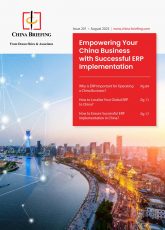Empowering Your China Business with Successful ERP Implementation – New Issue of China Briefing Magazine
The latest issue of China Briefing Magazine, “Empowering Your China Business with Successful ERP Implementation”, is now available as a complimentary download on the Asia Briefing Publication Store.
In this issue:
- Why is ERP Important for Operating a China Business?
- How to Localize Your Global ERP to China?
- How to Ensure Successful ERP Implementation?
2023 might be a banner year for ERP deployment in China. Enterprises are emerging from the pandemic, dusting off digital transformation or upgrade plans that may have been suspended, and moving aggressively to recalibrate and rebuild their organizations.
Amid China’s uneven economic recovery, rising geopolitical risks, and evolving global and Chinese tax and data compliance regimes, companies find themselves operating in an increasingly complex environment. Nevertheless, the China operations of numerous organizations grant unparalleled access to one of the world’s largest and most competitive markets, a critical asset for their global success.
Given this backdrop, ERP systems are gaining traction among international companies seeking to expand their presence in China or diversify their supply chains. These systems offer substantial benefits over conventional data management methods, notably in efficiency, process control, and risk mitigation.
In this special issue of China Briefing Magazine, we examine how businesses can successfully select, configure, and implement ERP systems for their China operations. We first present the key drivers behind a company’s ERP push and compare the pros and cons of different paths. Next, we introduce the importance of making local configurations when expanding global ERP to China. Lastly, we summarize the common pitfalls and corresponding tips that business leaders should pay attention to during the ERP implementation process.
Chapter 1: In the aftermath of COVID-19, ERP adoption is rapidly gaining traction in China as a strategic tool to navigate market uncertainties and promote organizational efficiencies. A number of ERP deployment options are accessible to firms operating in China, and these can be tailored to meet the requirements of diverse businesses, irrespective of their scale.
Chapter 2: Localized configurations are necessary when expanding your global ERP to China, either to meet local mandatory requirements or to secure optimal outcomes for your China operations. Yet, ERP localization is a complicated process that requires capable technical and professional support.
Chapter 3: Successful ERP implementation hinges on cultivating precise expectations, a profound grasp of business essentials, and a meticulous plan, while enlisting a capable implementer and employing shrewd end-user strategies to unleash the system’s transformative power.
We hope this magazine can help your business better prepare for the digital transformation. If you and your company want to learn more about maximizing the potential of ERP implementation, please get in touch with the experts at Dezan Shira & Associates. For more information, please email us at china@dezshira.com.
About Us
China Briefing is written and produced by Dezan Shira & Associates. The practice assists foreign investors into China and has done so since 1992 through offices in Beijing, Tianjin, Dalian, Qingdao, Shanghai, Hangzhou, Ningbo, Suzhou, Guangzhou, Dongguan, Zhongshan, Shenzhen, and Hong Kong.
Please contact the firm for assistance in China at china@dezshira.com. Dezan Shira & Associates has offices in Vietnam, Indonesia, Singapore, United States, Germany, Italy, India, Dubai (UAE), and Russia, in addition to our trade research facilities along the Belt & Road Initiative. We also have partner firms assisting foreign investors in The Philippines, Malaysia, Thailand, Bangladesh.
- Previous Article China Raises IIT Special Additional Deduction Standards on Three Expenses
- Next Article Qualifying for China’s Pre-Tax Super Deduction for R&D Expenses – A Case Study Review







